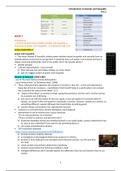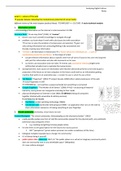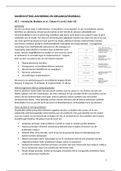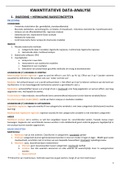Introduction to Rhetoric and Persuasion
Notes
INTRODUCTION TO RHETORIC AND PERSUASION
Objectives
§ Students obtain insight into the historical and recent developments in the research on rhetoric and
persuasion
§ Students enhance their skills in rhetorical analysis of argumentative texts.
§ Students have knowledges of the basic concepts of rhetorical theory
§ Student can make a rhetorical analysis of an argumentative text
§ Student can make an analysis of the strategic maneuvering in an argumentative text
Contents
The course Introduction to rhetoric and persuasion gives an introduction in theories of effective language use
from antiquity to modern times. First, the main features of Aristotelean rhetoric are discussed. Next, we turn
to modern theories of rhetoric and persuasion. Finally, the pragma-dialectical theory of strategic maneuvering
will be explained. In this theory rhetoric is systematically connected to dialectical argumentation theory. The
following topics are dealt with:
§ Ancient and modern theories of rhetoric
§ Rhetorical analysis
§ Strategic maneuvering
Week 1
à Introduction, Classical Rhetoric 1
The term rhetoric, rhetorical
à The term rhetoric or rhetorical has several meanings and connotations
§ Negative: empty, bombastic language without any substance.
“Not rhetoric but action”
“That is just rhetoric, nothing else”.
“Rhetoric is just spin and deception.”
§ More positive: flowery, ornamental speech (figures of speech, repetitions etc.: “I have a dream”)
Broad definition
Rhetoric is defined as the human use of symbols to communicate (effectively)
This definition includes three primary dimensions: (1) humans as the creators of symbols;
(2) symbols as the medium for rhetoric;
(3) communication as the purpose for rhetoric.
Narrow definition
Rhetoric is the theory of effective language or of persuasive language use:
What makes communication effective or persuasive?
Rhetoric as a perspective on argumentation
3 perspectives
§ Logic à study of proof: formal validity
§ Rhetoric à study of persuasive argumentation
§ Dialectic à study of reasonable discussion
In this sense a text is not rhetorical or logical.
, Introduction to Rhetoric and Persuasion
Notes
Where it starts: rhetoric in ancient Greece
During the period between approximately 3,000 B.C. and 850 B.C., kings ruled the various tribes in
Greece. The king was considered a descendant of God, usually Zeus, and he ruled with omniscience. In
civil affairs, the king was also supreme ruler.
But there is a shift towards democracy:
Between 850 B.C. and 650 B.C., during the period known as “The Age of Homer,” councils emerged to
administer the daily activities of the people and the king often deferred to the council in civil matters.
In 621 B.C. the citizens of Athens commissioned Dracon, an elder citizen considered to be the wisest of
the Greeks, His task was to transform the oral code of customs and traditions into a body of written
“laws,” (nomos).
In 594 B.C. the wise man, poet, and legislator Solon was asked to reform the Code of Dracon. Solon had
earned the trust of all Athenians, and his legal reforms would be adopted and used in Athens for the
succeeding three centuries.
Through his legal reforms, Solon introduced the first form of popular democracy into Athens, and his
judicial system remained intact throughout the classical age. Solon’s courts became the model for the
Romans and centuries later for England and America.
During the reign of Pericles Athens achieved its greatest glory. From his ascendance to power in 461 B.C.
to his death from the plague in 429 B.C., Pericles
Pericles constructed his empire principally on two complementary policies: imperialism and popular
democracy.
Throughout the Age of Pericles and the ensuing one hundred years after his death Athenians studied
rhetoric, and rhetoric played a critical role in Athenian social and political life.
Sofists
Persuasive speaking and writing were both historically and socially grounded in Greek culture when
Pericles ascended to power in Athens in 461 B.C. Oratory was a traditional part of Greek literature, and
Homer’s Iliad contains numerous persuasive speeches.
There was also a need for skilled public discourse.
To meet the need for skill in public discourse, a group of men emerged in Athens whose profession was
the study and practice of rhetoric. These were the “sophists,” a word derived from the Greek word
“sophos,” which means “wise.”
Sofists (pt. 1)
Corax and Tisias
According to an ancient tradition reflected in Aristotle, Cicero, and Quintilian, rhetoric was invented
about the year 476 B.C. by Corax, a resident of the Athenian colony of Syracuse in Sicily, and
transmitted to mainland Greece by his pupil, Tisias. The main tradition states that Corax devised a
systematic approach to argument when it became necessary to settle lawsuits over property
confiscated by tyrants. According to another version, Corax used his new skill in political assemblies
not in law courts.
Corax is best known for his “doctrine of general probability.”
The argument from probability or eikos
Argument from probability “Eikos”is based upon the idea that, of two propositions, one is more
likely to be true than the other one.
Example of the small and the larger man.
, Introduction to Rhetoric and Persuasion
Notes
Legend of Corax and Tisias
Corax sues Tisias for his fee for teaching him, and each man argues as follows:
Corax: You must pay if you win the case, because that would prove the worth of my lessons. If you
lose the case you must pay me also, for the court will force you to do so. In either case you pay.
Tisias: I will pay nothing, because if I lose the case it would prove that your instruction was
worthless. If I win, however, the court will absolve me from paying. In either case, I will not pay.
Note: probability plays an important role in rhetoric
Rhetoric seemed quite useful
In such public affairs, where exigencies of the situation make each decision unique, rhetoric proved
to be an effective method for deciding the appropriate course of action; that is, each person with a
position on the matter at hand gave his speech and decisions were based upon which speech
seemed most accurate, persuasive, appropriate at the time. In an uncertain world, there is no better
alternative to civil living.
But
For many observers of the Athenian judicial system, rhetoric as practiced, not necessarily as taught
by the sophists, was less a path to justice and more a means for making the worse cause appear the
better. Skill in argument often allowed the guilty to go free [Better call Saul]
Criticsm against the sofists
Smart ways of making the guilty look innocent
High fees for their education
More importantly their basic premise is dangerous:
“man is the measure of all things, of things that are as to how they are, and of things that are not as
to how they are not.” Protagoras
This idea asserts that each one of us sees the world differently, and thus each one of us forms our
own beliefs about the world around us.
Criticism on Sofists by Socrates and Plato
Gorgias: very critical Phaedrus: much milder
In the Gorgias it is stated:
1. That rhetoric has no subject matter of its own, as, for instance, medicine or sculpture does.
2. That since it has no subject matter of its own, rhetoric is speech about appearances, like cooking
or cosmetics.
3. That rhetoric is not good for the individual because it often allows the wrongdoer to go
unpunished simply because he is better at using words. It is better for the individual to suffer
punishment for wrongdoing than it is for his words to absolve him of punishment so that the evil is
still embedded in his soul.
4. That rhetoric is not good for society because it does not lead to truth, only persuasion, and only to
pleasure for the individual who is persuasive. Rhetoric is not necessarily good for the society that
must often suffer because wrong ideas have been advanced through persuasion. Rhetoric is, then,
the tool of the sceptic and the hedonist.
The Pheadrus as a blueprint for Aristotle’s rhetoric
1. Disgrace lies in speaking badly, not in the act of speaking itself.
2. Knowledge of the subject matter is essential to the speaker.
3. Rhetoric is most useful in doubtful matters, where the outcome is unclear.
4. The true art depends upon:
A. The speaker’s knowledge of nature
B. The speaker’s knowledge of the soul
Notes
INTRODUCTION TO RHETORIC AND PERSUASION
Objectives
§ Students obtain insight into the historical and recent developments in the research on rhetoric and
persuasion
§ Students enhance their skills in rhetorical analysis of argumentative texts.
§ Students have knowledges of the basic concepts of rhetorical theory
§ Student can make a rhetorical analysis of an argumentative text
§ Student can make an analysis of the strategic maneuvering in an argumentative text
Contents
The course Introduction to rhetoric and persuasion gives an introduction in theories of effective language use
from antiquity to modern times. First, the main features of Aristotelean rhetoric are discussed. Next, we turn
to modern theories of rhetoric and persuasion. Finally, the pragma-dialectical theory of strategic maneuvering
will be explained. In this theory rhetoric is systematically connected to dialectical argumentation theory. The
following topics are dealt with:
§ Ancient and modern theories of rhetoric
§ Rhetorical analysis
§ Strategic maneuvering
Week 1
à Introduction, Classical Rhetoric 1
The term rhetoric, rhetorical
à The term rhetoric or rhetorical has several meanings and connotations
§ Negative: empty, bombastic language without any substance.
“Not rhetoric but action”
“That is just rhetoric, nothing else”.
“Rhetoric is just spin and deception.”
§ More positive: flowery, ornamental speech (figures of speech, repetitions etc.: “I have a dream”)
Broad definition
Rhetoric is defined as the human use of symbols to communicate (effectively)
This definition includes three primary dimensions: (1) humans as the creators of symbols;
(2) symbols as the medium for rhetoric;
(3) communication as the purpose for rhetoric.
Narrow definition
Rhetoric is the theory of effective language or of persuasive language use:
What makes communication effective or persuasive?
Rhetoric as a perspective on argumentation
3 perspectives
§ Logic à study of proof: formal validity
§ Rhetoric à study of persuasive argumentation
§ Dialectic à study of reasonable discussion
In this sense a text is not rhetorical or logical.
, Introduction to Rhetoric and Persuasion
Notes
Where it starts: rhetoric in ancient Greece
During the period between approximately 3,000 B.C. and 850 B.C., kings ruled the various tribes in
Greece. The king was considered a descendant of God, usually Zeus, and he ruled with omniscience. In
civil affairs, the king was also supreme ruler.
But there is a shift towards democracy:
Between 850 B.C. and 650 B.C., during the period known as “The Age of Homer,” councils emerged to
administer the daily activities of the people and the king often deferred to the council in civil matters.
In 621 B.C. the citizens of Athens commissioned Dracon, an elder citizen considered to be the wisest of
the Greeks, His task was to transform the oral code of customs and traditions into a body of written
“laws,” (nomos).
In 594 B.C. the wise man, poet, and legislator Solon was asked to reform the Code of Dracon. Solon had
earned the trust of all Athenians, and his legal reforms would be adopted and used in Athens for the
succeeding three centuries.
Through his legal reforms, Solon introduced the first form of popular democracy into Athens, and his
judicial system remained intact throughout the classical age. Solon’s courts became the model for the
Romans and centuries later for England and America.
During the reign of Pericles Athens achieved its greatest glory. From his ascendance to power in 461 B.C.
to his death from the plague in 429 B.C., Pericles
Pericles constructed his empire principally on two complementary policies: imperialism and popular
democracy.
Throughout the Age of Pericles and the ensuing one hundred years after his death Athenians studied
rhetoric, and rhetoric played a critical role in Athenian social and political life.
Sofists
Persuasive speaking and writing were both historically and socially grounded in Greek culture when
Pericles ascended to power in Athens in 461 B.C. Oratory was a traditional part of Greek literature, and
Homer’s Iliad contains numerous persuasive speeches.
There was also a need for skilled public discourse.
To meet the need for skill in public discourse, a group of men emerged in Athens whose profession was
the study and practice of rhetoric. These were the “sophists,” a word derived from the Greek word
“sophos,” which means “wise.”
Sofists (pt. 1)
Corax and Tisias
According to an ancient tradition reflected in Aristotle, Cicero, and Quintilian, rhetoric was invented
about the year 476 B.C. by Corax, a resident of the Athenian colony of Syracuse in Sicily, and
transmitted to mainland Greece by his pupil, Tisias. The main tradition states that Corax devised a
systematic approach to argument when it became necessary to settle lawsuits over property
confiscated by tyrants. According to another version, Corax used his new skill in political assemblies
not in law courts.
Corax is best known for his “doctrine of general probability.”
The argument from probability or eikos
Argument from probability “Eikos”is based upon the idea that, of two propositions, one is more
likely to be true than the other one.
Example of the small and the larger man.
, Introduction to Rhetoric and Persuasion
Notes
Legend of Corax and Tisias
Corax sues Tisias for his fee for teaching him, and each man argues as follows:
Corax: You must pay if you win the case, because that would prove the worth of my lessons. If you
lose the case you must pay me also, for the court will force you to do so. In either case you pay.
Tisias: I will pay nothing, because if I lose the case it would prove that your instruction was
worthless. If I win, however, the court will absolve me from paying. In either case, I will not pay.
Note: probability plays an important role in rhetoric
Rhetoric seemed quite useful
In such public affairs, where exigencies of the situation make each decision unique, rhetoric proved
to be an effective method for deciding the appropriate course of action; that is, each person with a
position on the matter at hand gave his speech and decisions were based upon which speech
seemed most accurate, persuasive, appropriate at the time. In an uncertain world, there is no better
alternative to civil living.
But
For many observers of the Athenian judicial system, rhetoric as practiced, not necessarily as taught
by the sophists, was less a path to justice and more a means for making the worse cause appear the
better. Skill in argument often allowed the guilty to go free [Better call Saul]
Criticsm against the sofists
Smart ways of making the guilty look innocent
High fees for their education
More importantly their basic premise is dangerous:
“man is the measure of all things, of things that are as to how they are, and of things that are not as
to how they are not.” Protagoras
This idea asserts that each one of us sees the world differently, and thus each one of us forms our
own beliefs about the world around us.
Criticism on Sofists by Socrates and Plato
Gorgias: very critical Phaedrus: much milder
In the Gorgias it is stated:
1. That rhetoric has no subject matter of its own, as, for instance, medicine or sculpture does.
2. That since it has no subject matter of its own, rhetoric is speech about appearances, like cooking
or cosmetics.
3. That rhetoric is not good for the individual because it often allows the wrongdoer to go
unpunished simply because he is better at using words. It is better for the individual to suffer
punishment for wrongdoing than it is for his words to absolve him of punishment so that the evil is
still embedded in his soul.
4. That rhetoric is not good for society because it does not lead to truth, only persuasion, and only to
pleasure for the individual who is persuasive. Rhetoric is not necessarily good for the society that
must often suffer because wrong ideas have been advanced through persuasion. Rhetoric is, then,
the tool of the sceptic and the hedonist.
The Pheadrus as a blueprint for Aristotle’s rhetoric
1. Disgrace lies in speaking badly, not in the act of speaking itself.
2. Knowledge of the subject matter is essential to the speaker.
3. Rhetoric is most useful in doubtful matters, where the outcome is unclear.
4. The true art depends upon:
A. The speaker’s knowledge of nature
B. The speaker’s knowledge of the soul







